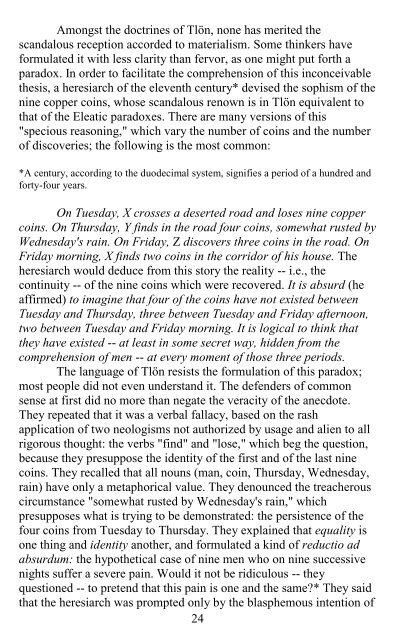Jorge Luis Borges - Labyrinths
Jorge Luis Borges - Labyrinths
Jorge Luis Borges - Labyrinths
You also want an ePaper? Increase the reach of your titles
YUMPU automatically turns print PDFs into web optimized ePapers that Google loves.
Amongst the doctrines of Tlön, none has merited the<br />
scandalous reception accorded to materialism. Some thinkers have<br />
formulated it with less clarity than fervor, as one might put forth a<br />
paradox. In order to facilitate the comprehension of this inconceivable<br />
thesis, a heresiarch of the eleventh century* devised the sophism of the<br />
nine copper coins, whose scandalous renown is in Tlön equivalent to<br />
that of the Eleatic paradoxes. There are many versions of this<br />
"specious reasoning," which vary the number of coins and the number<br />
of discoveries; the following is the most common:<br />
*A century, according to the duodecimal system, signifies a period of a hundred and<br />
forty-four years.<br />
On Tuesday, X crosses a deserted road and loses nine copper<br />
coins. On Thursday, Y finds in the road four coins, somewhat rusted by<br />
Wednesday's rain. On Friday, Z discovers three coins in the road. On<br />
Friday morning, X finds two coins in the corridor of his house. The<br />
heresiarch would deduce from this story the reality -- i.e., the<br />
continuity -- of the nine coins which were recovered. It is absurd (he<br />
affirmed) to imagine that four of the coins have not existed between<br />
Tuesday and Thursday, three between Tuesday and Friday afternoon,<br />
two between Tuesday and Friday morning. It is logical to think that<br />
they have existed -- at least in some secret way, hidden from the<br />
comprehension of men -- at every moment of those three periods.<br />
The language of Tlön resists the formulation of this paradox;<br />
most people did not even understand it. The defenders of common<br />
sense at first did no more than negate the veracity of the anecdote.<br />
They repeated that it was a verbal fallacy, based on the rash<br />
application of two neologisms not authorized by usage and alien to all<br />
rigorous thought: the verbs "find" and "lose," which beg the question,<br />
because they presuppose the identity of the first and of the last nine<br />
coins. They recalled that all nouns (man, coin, Thursday, Wednesday,<br />
rain) have only a metaphorical value. They denounced the treacherous<br />
circumstance "somewhat rusted by Wednesday's rain," which<br />
presupposes what is trying to be demonstrated: the persistence of the<br />
four coins from Tuesday to Thursday. They explained that equality is<br />
one thing and identity another, and formulated a kind of reductio ad<br />
absurdum: the hypothetical case of nine men who on nine successive<br />
nights suffer a severe pain. Would it not be ridiculous -- they<br />
questioned -- to pretend that this pain is one and the same* They said<br />
that the heresiarch was prompted only by the blasphemous intention of<br />
24


